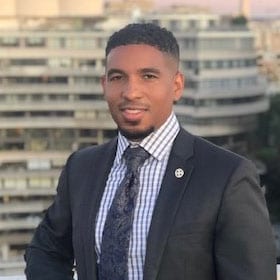Vice President, Health Care Innovation
Morgan Health, JPMorgan Chase
FOCUS
Brandon Batiste’s vision for a Culture of Health is an inclusive, patient-centered, community-focused, integrated system of care that is built on evidence-based practice, wellness, and recovery. He aims to build economic and healthcare delivery systems that create access to behavioral health, substance abuse, and associated therapies for communities in need.
On average, one in five people in the United States is dealing with an undiagnosed behavioral health issue, and more often than not, will not seek treatment or get appropriate care due to stigma, barriers to access, and limited provider availability. Additionally, behavioral health is often overlooked as a public health issue due to a historical focus on communicable and more immediately life-threatening diseases (such as cancer and HIV/AIDS); however,it has profound effects on an individual’s physical and social wellbeing, quality of life, and economic productivity. The wrinkles of our nation’s fragile mental health infrastructure permeate through every facet of the human experience and are pronounced in the opioid crisis, mass shootings, and increasing suicide rates. Furthermore, the divide in primary care, especially for patients dealing with more than one behavioral health condition, often breaks the system for underserved communities in need. These challenges are further demonstrated in a healthcare workforce that is not reflective of the populations it serves or equipped to adequately address their needs.
Brandon seeks to build a Culture of Health that eliminates the stigma associated with mental health, increases access to behavioral health treatment therapies, and promotes the integration of mental health with physical medicine.
STRATEGIC INITIATIVE: Providing Behavioral Health Support in Humanitarian Emergencies
On average, one in five people in the United States has an undiagnosed behavioral health issue, and more often than not, will not seek treatment due to stigma, barriers to access, and limited provider availability. The behavioral health implications increase threefold for residents living in or adjacent to disaster-prone areas. Even in cases where there is no direct impact, experiencing or witnessing weather disasters can disrupt a person’s life in many ways, including physical and mental health struggles, such as increased levels of anxiety, depression and PTSD. The strategic initiative, “Providing Behavioral Health Support in Humanitarian Emergencies,” in collaboration with the Congress for Humanitarian & Economic Progress, focuses on integrated partnerships to eliminate barriers to community wellness. The Key tenets of the initiative, from my perspective include: (1) changing the dialogue around health in Gulf Coast areas to ensure the inclusion of SDOH and psychological wellbeing; 2) preparing individuals, organizations, and institutions to do their work through a trauma-informed lens; 3) reducing stigma around the utilization of behavioral health services; and 4) catalyzing action to advocate for an increase in both the amount and variety of affordable, quality, culturally resonant mental health services.
MORE ABOUT BRANDON
As a Culture of Health leader, Brandon offers a unique perspective that recognizes the intricate layers of the human experience. Brandon’s fervor lies in aligning strategies to tackle real-world issues through pragmatic and community-driven approaches. He is deeply involved in grassroots initiatives that empower communities to demand improved health, both in terms of public policy and individual wellbeing.
One of his foremost objectives is to streamline the delivery of behavioral healthcare to address a broad range of issues for as many people as possible. Drawing from his diverse background spanning government, nonprofits, academia, private equity, and community health, he brings a wealth of provider and community perspectives to the table. He also brings a global perspective, with experience in Haiti, Saudi Arabia, South Africa, and Belize.
Click here to watch Brandon’s Legacy Project video.

